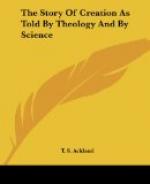But it may be said, “Is not this the case with all sciences, at least in their earlier stages? Are there not frequently, or always, many phenomena which at first seem inexplicable, but which are gradually accounted for as knowledge increases? If, then, this is no objection in scientific pursuits generally, why should it be so here?” This reasoning would be perfectly valid if Darwinism were regarded simply as a scientific investigation. But it is under consideration now on very different rounds. Whatever Mr. Darwin’s own views may be, the theory is brought forward by others, not as a mere interesting speculation, but as antagonistic to a record whose authority is attested by evidence of the very highest class. It claims to discredit that record, and to be received as a substitute for it. But that record, however it may be interpreted, does give us adequate causes for all that it professes to account for, in the will and operation of an Almighty Creator. The theory, therefore, which professes to supplant it, must at least stand upon an equal ground—it must give an adequate account of everything. There must be no unverified laws. To fall back upon such laws is in reality to fall back on the working of that very power whose operation is formally denied. [Footnote: See Foster’s Essays, Essay i. Letter 5.]
The next point to be noticed is a great confusion between assumptions and proved facts. This is especially prominent in that part of his last work which is devoted to sexual selection. Thus, in one case it is taken for granted, that various characteristics of the males “serve only to allure or excite the female.” [Footnote: Descent of Man, vol. i. p. 258.] “Hence” (because brilliant colours of insects have probably not been acquired for the purpose of protection), “I am led to suppose that the females generally prefer, or are most excited by the more brilliant males.” [Footnote: Ibid. p. 399.] “Nevertheless, when we see many males pursuing the same female, we can hardly believe that the pairing is left to blind chance; that the female exerts no choice, and is not influenced by the gorgeous colours, or other ornaments with which the male alone is decorated” [Footnote: Descent of Man, vol. i p. 421.] Such sentences are of continual occurrence, and do duty in the argument as if they expressed ascertained facts. And not only this, but in the very part of the work which is devoted to establishing the adequacy of sexual selection to produce certain effects, that adequacy is assumed from the very beginning. Thus, we read, “That these characters are the result of sexual selection is clear,” [Footnote: Ibid. p. 258.] before we have got six pages into an argument which occupies a volume and a half. This is surely a strong instance of what is commonly called “begging the question.” Another instance of confusion of ideas is to be found in the assumption of design which occasionally occurs. Thus, we read, “In




